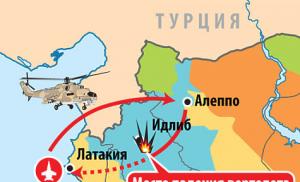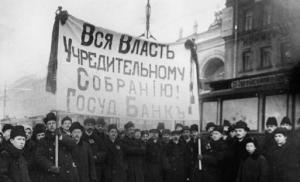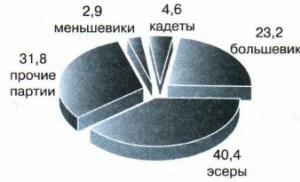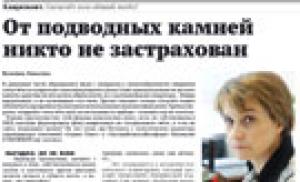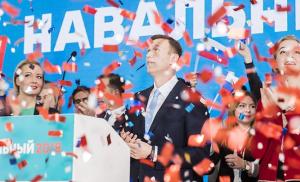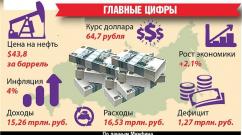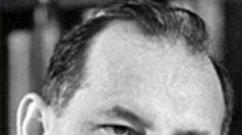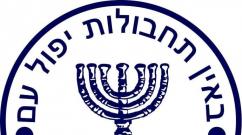Navalny has been nominated as a candidate for the presidency of Russia. Alexey Navalny announced his intention to run for president of Russia Alexey Navalny announced his candidacy
Good afternoon, dear friends! I was recently asked the question why Navalny cannot run for President? To be honest, I also heard about this, but didn’t delve into it. Agree, given his popularity (not everyone loves him, but some simply hate him), it would be nice to look at him as a candidate and opponent to Putin. On the other hand, in order to run for President, you must meet certain criteria. The most well-known criterion is reaching the age of 35 years. I am silent about the fact that the candidate must be a citizen of the Russian Federation.
Let's figure it out together whether Alexei is really not allowed to participate in the elections, and why this happened. Or maybe this isn't true? After all, there are some legal restrictions and criteria for candidates!
Video on the topic:
Law and restrictions
Let's find out what restrictions are provided by law for presidential candidates. I will immediately make a reservation that election legislation is subject to frequent changes. In addition, electoral legislation is not always fair. For example, in some regions of our country, a system is used to determine voting results. This system is banned in many countries as not fair and proportionate. The very fact of using such a vote counting system already indicates serious problems in the electoral system. But let's return to the presidential elections.
Elections of the head of state are regulated by the following normative acts: the Constitution of the Russian Federation, the Federal Law “On the Basic Guarantees of Electoral Rights and the Right to Participate in a Referendum of Citizens of the Russian Federation”, the Federal Law “On the Election of the President of the Russian Federation”. Other laws may also regulate the procedure and rules for conducting presidential elections. Thus, elections of the head of state can only be regulated by federal legislation.
What is written in the Constitution?
Article 81 of the Constitution of the Russian Federation establishes literally two criteria for presidential candidates:
A citizen of the Russian Federation who is at least 35 years old and has permanently resided in the Russian Federation for at least 10 years can be elected President of the Russian Federation.
Article 32 of the Constitution of the Russian Federation provides that not Citizens declared incompetent by a court, as well as those held in prison by a court verdict, have the right to vote and be elected.
What is written in election laws?
Not eligible to run:
- a citizen declared incompetent by a court;
- a person held in a place of deprivation of liberty by a court verdict;
- having citizenship of a foreign state, a residence permit or other proof of residence in the territory of a foreign state;
- sentenced to imprisonment for a serious (plus 10 years from the date of expungement or expungement of the criminal record) or especially serious crime (plus 10 years from the date of expungement or expungement of the criminal record) and having an unexpunged and outstanding criminal record on voting day;
- convicted of committing a crime of an extremist nature, and having an unexpunged and unexpunged conviction for the specified crime on voting day;
- brought to administrative responsibility under Art. Art. 20.3 and 20.29 Code of Administrative Offenses of the Russian Federation;
- a person who has committed an action prohibited by the legislation on countering extremism, if such a fact is established. The ban will last for six years.
In addition, a president cannot serve more than two consecutive terms.
Navalny's restrictions
It is known that the oppositionist is regularly brought to administrative or criminal liability and also regularly and successfully defends his own. Thus, if at a certain moment Navalny meets all the necessary criteria provided by law, he will be able to become a presidential candidate.
I am currently aware of the following limitations:
- The verdict in the “Kirovles case” under Part 4 of Art. 160 of the Criminal Code of the Russian Federation for organizing the embezzlement of someone else’s property on an especially large scale. This crime is classified as a serious crime; accordingly, the oppositionist will not be able to run for office for 10 years after the conviction is cleared.
Let me remind you that there were two verdicts in the “Kirovles case”. The first verdict was overturned by the Supreme Court after the ECHR decision. The European Court indicated that the Russian court limited the oppositionist’s right to a fair trial; the court did not examine Navalny’s statement about the political motive of the case. In addition, the ECHR indicated that the case was opened after a direct order from the head of the Investigative Committee (in respect of whom the oppositionist was conducting an anti-corruption investigation) and that Navalny’s actions did not differ from ordinary commercial activities.
- The YvesRocher case. Alexey and his brother Oleg were accused of committing large-scale fraud and money laundering. Alexei received a suspended sentence, but his brother received a real one; he was sent to prison. The offense is classified as serious.
An appeal was filed with the ECHR against the court's decision in the case. The European Court ruled that the brothers were deprived of their right to a fair trial.
conclusions
Thus, the following situation arose. On the one hand, there are restrictions provided for by the law on elections of the head of state, according to which Navalny will not be able to participate in elections for at least 10 years from the moment his criminal record is cleared. On the other hand, the “second” decision in the Kirovles case (which was made after the decision of the ECHR) copies the “first” decision, which seems to have been adopted in violation of the Convention for the Protection of Rights and Fundamental Freedoms. And the decision in the “Yvrocher case” was also made in violation of the Convention in terms of the right to a fair trial (ECtHR decision).
Navalny refers to the Constitution, which says what nCitizens held in places of deprivation of liberty by a court sentence do not have the right to elect and be elected. And he is not in prison.
Thus, it turns out, according to the oppositionist , there is a collision. The Constitution limits only persons in prison, and the law on presidential elections introduces additional expansive restrictions unjustifiably, since the Constitution defines the full list of persons who cannot run for office.
I believe that in fact Navalny will not be allowed to participate in the presidential elections on the grounds that he has a criminal record and must wait the period prescribed by law. However, I have certain doubts about the constitutionality of such a provision. But this is already within the competence of the Constitutional Court.
Illustration copyright Sergey Fadeichev/TASS Image caption Navalny called on other candidates to boycott the elections if he was denied registration
An initiative group of voters on Sunday in Moscow voted to nominate opposition leader Alexei Navalny for president.
The founder of the Anti-Corruption Foundation, Alexei Navalny, said that he will participate in the 2018 presidential elections as a self-nominated candidate.
To do this, by law, he must assemble an initiative group of at least 500 voters, which will officially nominate him as a candidate.
- Presidential candidate from the Communist Party of the Russian Federation: “I’m no better than Zyuganov”
- “Normal feelings”: has Putin abandoned United Russia?
- “Some kind of pig in a poke”: Sobchak was officially nominated for president
On Sunday evening, Navalny submitted his nomination documents to the Central Election Commission, and the commission accepted them. Now the CEC must check these documents, as well as the oppositionist’s criminal record, and respond within five days.
The initiative group gathered on Sunday in a tent in Serebryany Bor in Moscow, on beach No. 3. Members of Navalny’s headquarters explained that they were unable to find premises - all landlords refused them.
The oppositionist himself did not speak at the meeting of the initiative group before the vote, and then left, accompanied by his wife and children.
“I want to make it clear and clear: we are ready to win this election and we will win it!” - said Navalny.
- According to a June survey by the Levada Center, 55% of Russians know about Navalny. In December, 2% of Russians named Navalny as the politician they trust most.
“Yesterday, without sparing myself, forcing myself, I watched the congress of United Russia. And there Putin said that Russia would become one of the five strongest economies in the world. But six years ago at this congress he said the same thing. We entered the top five? No!" - said the candidate. "Do any of you want to lose another six years?" - he asked the crowd. The crowd chanted "No!"
“You are a bad president, you have no positive agenda, we challenge you in this election and we intend to win it!” - Navalny addressed Putin.

Media playback is unsupported on your device
How Navalny was nominated for president"Just try not to let us vote! We'll go on strike!" - Navalny threatened
He called on the remaining candidates to withdraw their candidacies five days before the election if he is not registered, and to demand that the Kremlin launch a new campaign.
He called himself "the main candidate."
The CEC previously announced that it would send its representatives to the event. However, in the end, two representatives of the Moscow city election commission came and refused to give any comments.
"Any person should have the right to run"
The rallies in support of Navalny, which took place from the beginning of 2017, were remembered for the fact that students and schoolchildren took part in them. After this, educational conversations began to be held in schools in Russia about the inadmissibility of participation in protests.
In total, 753 people gathered to nominate Navalny - that’s exactly how many signatures were certified by the notary present at the event. 742 participants voted for Navalny’s nomination (by law, at least 500 are required). Now members of Navalny’s headquarters must transfer these signatures to the Central Election Commission (CEC).
- Navalny has already taken part in an election campaign once: in 2013, he ran for mayor of Moscow. According to the voting results, he received 27.24% of the votes and received second place.
But mainly middle-aged and elderly people gathered in Serebryany Bor to officially nominate Navalny. From seven in the morning a long line lined up outside the tent.
“Navalny has proven that he is the bravest and most desperate and against Putin!” - Navalny's elderly supporters said enthusiastically in line.
- The highlight of the election program: what Navalny offers Russians
- Sports and pop stars: who will nominate Putin for elections
Navalny's volunteers, all of whom appeared to be between 20 and 30 years old, handed out mandates to voters in the form of red signs, tricolor flags and company badges. Hot drinks and food were provided for them.
“The point is not about Navalny, but about the fact that any person should have the right to stand for election,” the young voter explained her participation in the initiative group.
Illustration copyright Sergay Fadeichev/TASS Image caption 742 people voted for Navalny’s nominationNavalny is actively campaigning and has opened his headquarters in several dozen regions. However, the Central Election Commission has repeatedly emphasized that he does not have the right to participate in elections in the Kirovles case (in February he was re-sentenced to five years of suspended imprisonment).
Navalny himself challenged the verdict in the ECHR, and in the fall the Committee of Ministers of the Council of Europe called for him to be allowed to participate in the elections. Members of the headquarters emphasized that according to the Constitution, Navalny must be registered, and only people in prison cannot run.
Initiative groups for the nomination gathered on December 24 in another 19 cities, Navalny’s headquarters reported.
If the CEC registers the appeal of the initiative group, Navalny will have to collect another 300 thousand signatures of voters in different regions of Russia for the nomination.
Alexey Navalny received the formal right to participate in the 2018 presidential elections. This follows from the decision of the Supreme Court, which overturned the verdict in the “Kirovles case,” said the lawyers of the opposition politician
Alexei Navalny will again be able to participate in the elections, his lawyers Vadim Kobzev and Olga Mikhailova told RBC. They explained that this opportunity was given to him by the decision of the Supreme Court to overturn the verdict of the lower court in the “Kirovles case” and.
Participation in elections for those convicted of serious and especially serious crimes is prohibited by Article 4 (clause 3.2) of the law “On Basic Guarantees of Electoral Rights.” In February 2014, this article was amended to clarify that those convicted of serious crimes can run again nine years after their convictions have been expunged, and for especially serious ones - after 15.
Now Navalny has two convictions left - in the case of embezzling funds from the Yves Rocher company and for slandering Moscow deputy Alexei Lisovenko. However, both crimes are not classified as serious and therefore do not affect voting rights, Kobzev clarified. At the same time, the defender noted that he knows nothing about Alexei Navalny’s plans to participate in the elections. Navalny’s right to run after the decision of the Supreme Court was confirmed by RBC and Olga Mikhailova.
Video: RBC TV channel
An RBC source close to Navalny said that he has not yet decided whether he will run for president in 2018. “It is important that he retains this opportunity at the time the elections are announced,” RBC’s interlocutor emphasized.
For the authorities, Navalny’s participation in the elections could be a risky scenario, says political scientist Abbas Gallyamov: “He will have access to television and will tell the whole country about how corrupt [President Vladimir] Putin is. The result will be unpredictable,” the expert told RBC. At the same time, he believes that allowing Navalny to participate in the elections will allow them to be called more legitimate.
The Supreme Court drew attention to the “Kirovles case” in connection with the decision of the European Court of Human Rights (ECtHR), which in February 2016 found that the rights of those convicted in it, Alexey Navalny and Pyotr Ofitserov, to a fair trial had been violated (according to Article 6 of the European Convention on human rights). In July 2013, Navalny and Ofitserov were sentenced by the Leninsky District Court of Kirov to five and four years in prison, respectively, in the case of theft of property from the Kirovles company. In October of the same year, the court replaced the sentence with a suspended sentence. The convicts argued that their actions did not constitute a crime, and the criminal case was politically motivated. At the same time, Alexei Navalny took part in the elections for the mayor of Moscow in 2013, in which he received more than 27% of the votes.
“I thought for a long time whether I should take part in them. And I came to the conclusion that yes, I will take part in the Russian presidential elections. I am going to the polls and I will fight for victory,” he said in a video posted online. A separate website was also launched for the presidential campaign.
Currently, the law allows him to run for president. However, it is not a fact that this state of affairs will continue until 2018. The criminal “Kirovles case”, of which he is still a defendant, is sent for further investigation.
The oppositionist received a guilty verdict in the summer of 2013. He was accused of embezzling funds from the Kirovles logging company in the Kirov region. At this time, Navalny worked as a freelance adviser to the regional governor. The case was sent for appeal.
In November, the Kirovles case reached the Supreme Court of the Russian Federation. He did not reverse the decision, but decided to send the case for review, which caused a sharp reaction from Navalny himself, who considers himself innocent. This happened after Navalny’s case was heard in the European Court of Human Rights. found a violation of the right to a fair trial in the case.
Due to the fact that the case was sent for a new trial at the request of the ECHR, Navalny has the right to run for office in the highest echelons of power, his lawyer said.
Earlier, the press secretary of the Russian President Dmitry did not comment on Navalny’s statements about an attempt to put pressure on him with the help of the “Kirovles case.”
Peskov also stated that the Kremlin has no opinion about the prospects for Navalny’s participation in the upcoming presidential elections.
The director of the International Institute of Political Expertise believes that Navalny’s decision may be “connected with the Kirovles case in order to give it political interest.”
“When talking about Navalny’s chances, it is first worth answering the question whether Navalny will be able to register as a candidate, because not a single parliamentary party will nominate him,” added the Gazeta.Ru interlocutor.
Navalny already has experience participating in elections. He ran for mayor of Moscow in 2013. Then he took second place - after the current mayor of the capital, receiving, according to official data, almost 28% of the votes. Navalny’s headquarters used bright slogans and propaganda cubes, in the manner of European politicians.
Minchenko considers the second problem to be the collection of signatures for Navalny’s registration and the infrastructure necessary to collect these signatures.
Under pressure
There is also a factor of psychological pressure, the expert believes: Alexei's brother Oleg Navalny received a 3.5-year sentence in the case of theft of funds from the French company "". Navalny himself was sentenced to probation in December 2014.
Mikhail, president of the St. Petersburg Politics Foundation, expected this decision from Navalny. “This is an interesting political figure in the elections. The main question here is what Alexey Navalny will fight for: participation in the elections or for the results. It seems to me that for participation,” the expert told Gazeta.Ru. “The second question is whether he will be able to implement his election strategy, which he used in the elections in Moscow in 2012, mobilizing a protest electorate.”
“Will it be possible to use a similar strategy on a national scale? Maybe. If there is a political decision on Navalny’s participation in the elections, then which party he will go with is a technical question, it is not fundamental,” Vinogradov added.
It is theoretically possible to discuss Navalny's nomination from . The co-chairman of the St. Petersburg branch of the party told Gazeta.Ru that, although the mood in the party is different, he is personally ready to support the oppositionist in his nomination, since at the moment he does not see any other alternative candidate ready for the campaign.
A source close to the leadership, in a conversation with Gazeta.Ru, said that the conversation about choosing a single opposition candidate for the presidential elections had been raised for a long time. We also talked about this with Navalny. The option of holding a debate was discussed. However, at the moment, the leader of Yabloko is already planning to run for election, having previously announced this.
“Now we have to wait for the court’s decision. And after that we can discuss anything,” the source told Gazeta.Ru. He also added that, in his opinion, Navalny’s decision is an attempt to put pressure on the court.
“If he is not acquitted, he will say that the decision is politicized, since the authorities simply did not want to let him take part in the elections,” explains Gazeta.Ru’s interlocutor.
Blogger and political activist Alexei Navalny became famous as the leader of (FBK). The organization is engaged in exposing financial fraud of large companies with state participation, as well as government officials.
Navalny also became the face of protest rallies on Bolotnaya Square and Sakharov Avenue in 2011. Alexei Navalny also attracted moderate nationalists to his side and came out with an anti-migrant agenda.
A few days before Navalny’s announcement of his intention to run for president, the film “Navalny and the Party” was shown. There, his former associates spoke negatively about Navalny, in particular a lawyer and a former deputy who now lives in the United States.
Navalny has no chance of running for president
No chance? Lawyer talks about Navalny’s access to the elections. Lawyer Vladimir Starinsky weighed in Alexei Navalny's chances of participating in the presidential elections.
On November 29, the press service of the Constitutional Court (CC) stated that candidates with a criminal record are prohibited from participating in the elections. Thus, the court responded to the statement of the Constitutional Court judge Konstantin Aranovsky, who expressed disagreement with the fact that those on probation for serious offenses cannot run for office for ten years after expunging their criminal record.
This “mini-split” in the ranks of the Constitutional Court judges was given particular piquancy by the fact that the Russian authorities referred precisely to this legislative restriction when talking about the impossibility of registering an opposition figure as a presidential candidate.
Managing partner of the Starinsky, Korchago and Partners bar association, Vladimir Starinsky, said that Navalny has no chance of running for president, since decisions of the Constitutional Court of the Russian Federation are final and cannot be appealed:
– This is directly provided for in Art. 79 of the federal law “On the Constitutional Court of the Russian Federation”. Therefore, Navalny has no opportunity to appeal the decision of the Constitutional Court. As for the dissenting opinion of [Konstantin Aranovsky], in the Russian legal system it does not entail any legal consequences - it is just the opinion of a specific judge, which can be read.
Navalny filed a complaint against the second sentence to the ECHR, but there is a possibility that the court will not have time to consider the case before the elections, Starinsky explained. – Even if the case is considered again, the ECHR cannot oblige the Russian court to issue an acquittal, therefore, there is practically no chance that Navalny will be allowed to participate in the elections. The refusal to register today fully complies with the requirements of Russian legislation,” the lawyer concluded.
Navalny's lawyer commented on the prosecutor's refusal to allow him to participate in the elections
Navalny’s lawyer about the Prosecutor General’s Office not allowing him to participate in the elections: “There should be no disputes or speculation on this matter.”
The Prosecutor General's Office of the Russian Federation denied Alexei Navalny the right to participate in the 2018 elections: the head of the departmental department for oversight of the observance of the rights and freedoms of citizens, Larisa Kopteva, stated that he had no legal grounds for this.
The main arguments of Ms. Kopteva were the verdict of the Leninsky District Court of Kirov dated February 8, 2017, according to which Alexei Navalny was sentenced to 5 years of suspended imprisonment with a probationary period of 1 year and 5 months under Part 3 of Article 33 and Part 4 of Article 160 of the Criminal Code RF, as well as the Federal Law “On Basic Guarantees of Electoral Rights”, according to which “a citizen of the Russian Federation who is held in prison, as well as sentenced, including to imprisonment for committing a serious crime, and who has a voting day, unexpunged and unexpunged criminal record.”
We would like to remind you that the Kirov court handed down the mentioned sentence again after Navalny appealed the court verdict in the “” case of 2013 to the ECHR. The European Court, in particular, ruled that the plaintiffs' right to a fair trial had been violated and that what they were accused of was no different from ordinary commercial activity. The case was sent for review, but the Leninsky District Court again found Navalny guilty of stealing 10 thousand cubic meters of timber from the Kirovles enterprise and handed down the same verdict, in which nothing had changed, including spelling and punctuation errors.
We initially declared the direct effect of the Constitution of the Russian Federation (Article 32, Part 3. “Citizens recognized by the court as incompetent, as well as those held in places of deprivation of liberty by a court sentence, do not have the right to be elected.” - Ed.), which allows Alexey to participate in the elections,” Alexei Navalny’s lawyer Olga Mikhailova commented on the statement of the representative of the Prosecutor General’s Office. “In addition, we have an unexecuted decision of the ECHR, according to which the criminal case should be terminated, and the Russian Federation is obliged,” the lawyer emphasizes, “to comply with the decisions of the ECHR.” And there should no longer be any controversy or speculation on this matter.
On October 17, the head of the Russian Central Election Commission, Ella Pamfilova, announced that Navalny would be able to participate in elections after 2028, noting that supporters of the oppositionist were spreading false information about his right to participate in them as early as March 2018. At Navalny’s headquarters, Ms. Pamfilova was reminded of the same article. 32, part 3 of the Constitution of the Russian Federation, as well as about Art. 15, Part 1 of the Basic Law, which states that the Constitution of the Russian Federation “has supreme legal force, direct effect and is applied throughout the territory of the Russian Federation.” Alexei Navalny himself spoke quite sharply in his blog on October 22: “The pug Pamfilov can say anything - we have a greater right to participate in the elections than the rest of the candidates combined. We work very hard to make sure voters can make their choice.”

